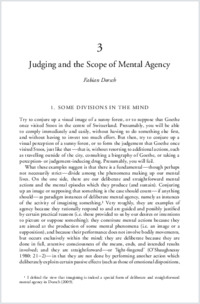Judging and the Scope of Mental Agency
BHAP-PH
- Dorsch, Fabian Université de Fribourg
-
2009
Published in:
- Mental Actions / Soteriou, Matthew. - Oxford University Press, reproduced by permission of Oxford University Press (linked below). - 2009, p. 38-71
English
What is the scope of our conscious mental agency, and how do we acquire self-knowledge of it? Both questions are addressed through an investigation of what best explains our ability to form judgemental thoughts in direct response to practical reasons. Contrary to what Williams and others have argued, it cannot be their subjection to a truth norm, given that our failure to adhere to such a norm need not undermine their status as judgemental. Instead, it is argued that we cannot form judgements at will because we subjectively experience them as responses to epistemic reasons, and because this is incompatible with our experiential awareness of direct mental actions, such as imagining. However, this latter awareness does not extend to indirect agency, which relies on epistemic or causal processes as means. Judging may therefore still count as an indirect action — just like, say, breaking a window by throwing a stone.
- Faculty
- Faculté des lettres et des sciences humaines
- Department
- Département de Philosophie
- Language
-
- English
- Classification
- Philosophy, psychology
- License
-
License undefined
- Identifiers
-
- RERO DOC 233370
- DOI 10.1093/acprof:oso/9780199225989.003.0003
- Persistent URL
- https://folia.unifr.ch/unifr/documents/304058
Statistics
Document views: 93
File downloads:
- Texte intégral: 188
